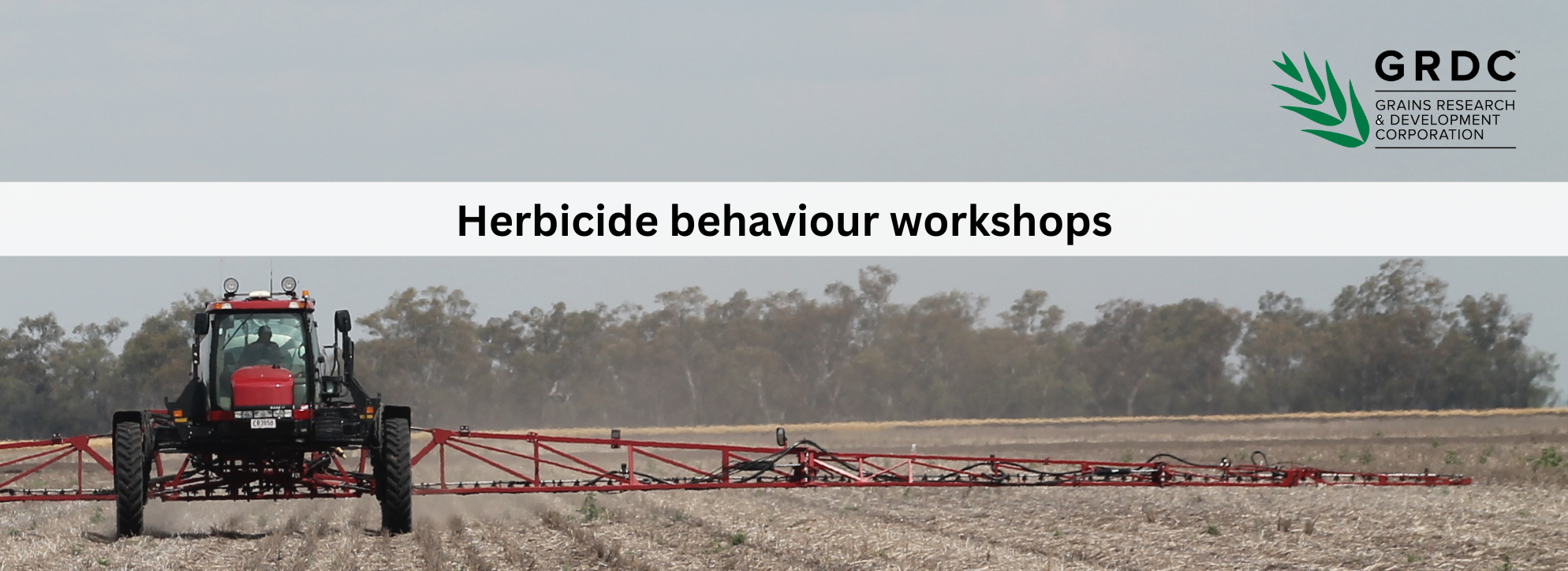
GRDC supported workshops for agronomists on the science underpinning how herbicides work and its application to field practice.
These workshops will focus on the biological pathways and environmental factors that influence herbicide performance, along with interactions that may occur when products are mixed and will be delivered by ICAN Senior Consultant Mark Congreve.
Herbicide resistance is also changing product use. In many situations, products and mixtures that previously worked are now less effective.
Participants will leave with a better understanding of the key factors dictating herbicide performance and what can be done in the paddock to ensure weed control is maximised.
Knowing what weeds will be controlled from a herbicide application is the easy bit – it’s on the label.
More challenging questions include:
- Why do herbicides perform or fail in some situations? How do environmental factors influence this?
- What can happen when we tank mix?
- Critical comments on the label. Why are they important?
- How do adjuvants and water conditioning agents work? What should be used, when and why?
- How does resistance affect different herbicides? What strategies can be used as resistance emerges?
- How do residual herbicides work and what influences their breakdown?
Dates and locations:
- Griffith, NSW - Tuesday 1 & Wednesday 2 July 2025
Griffith Exies Sports Club, 33 Speirs St, Griffith, NSW 2680
[FULL CLOSED TO REGISTRATION - email erica@icanrural.com.au to go on a waiting list] - Dubbo, NSW - Thursday 3 & Friday 4 July 2025
Dubbo RSL, Cnr Brisbane & Wingewarra St, Dubbo, NSW 2830
[FULL CLOSED TO REGISTRATION - email erica@icanrural.com.au to go on a waiting list] - Port Lincoln, SA - Thursday 24 & Friday 25 July 2025
Port Lincoln Hotel, 1 Lincoln Highway Port Lincoln, SA 5606
[FULL CLOSED TO REGISTRATION - email erica@icanrural.com.au to go on a waiting list] - Moama, NSW - Tuesday 5 & Wednesday 6 August 2025
Rich River Golf Club, Twenty Four Ln, Moama, NSW 2731 - Wagga Wagga, NSW - Thursday 7 & Friday 8 August 2025
Charles Sturt University, Bld 452, Bangala Rd, Wagga Wagga NSW 2650
[FULL CLOSED TO REGISTRATION - email erica@icanrural.com.au to go on a waiting list]
Who will benefit most from this workshop?
The workshop is primarily targeted to agronomists.
- Early career agronomists will get a crash course in important factors driving herbicide performance. Ideally you will have 1-2 seasons in the field and already have a working understanding of key herbicides, their mode of action groups, what weeds they target, and in which crops they are used.
- Experienced agronomists will be able to fine-tune their herbicide knowledge and focus on maximising performance by optimising herbicide applications. This includes considering compromises that will occur when making complex tank mix decisions and how we balance this with the need for operational efficiency on the farm. Understanding how herbicides work also assists to make every decision a winner with respect to application coverage, setting grower expectations and forensic evaluation when things don’t go to plan.
- Researchers find the workshop useful to understand how chemical properties dictate herbicide uptake and environmental performance. This knowledge can then be transferred to new products in development to optimise timing, application and adjuvant requirements for field trials and subsequent development of label statements.
- Growers interested in understanding the principles that drive herbicide performance will also get a lot from this workshop. However, the workshop does not attempt to address individual herbicide strategies for specific weeds in individual fields. Specific weed control recommendations need to consider local conditions and are best informed by a local agronomist.
Please note: Workshop numbers will beare capped to ensure effective participation. Workshop registrations will be accepted on a first-in basis and a ‘wait list’ will be established for workshops that sell out.
Online registration is available below. If you would like to register multiple people from the same organisation, please contact us for a group booking.
<< Herbicide behaviour workshop registration
Additional workshops and locations will be added based on demand. Please click the button below to express your interest in additional workshops.
<< Click here to register your interest for future workshops
For further information erica@icanrural.com.au or Ph: 02 9482 4930.
